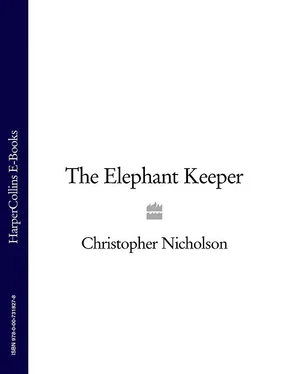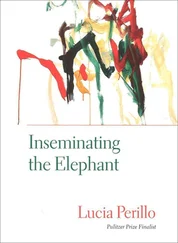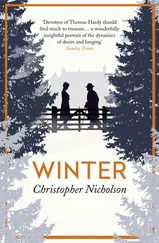Other pieces of intelligence, which may be of interest to the reader, are as follows:
That, when wild, Elephants feed chiefly on grass, leaves, bark and fruit; among their favourite foods being a crescent-shaped fruit with a tough green skin, known as a banana;
That wild Elephants sometimes break into the corn fields, committing terrible ravages, and have to be driven out by the natives;
That Elephants have long memories, and if subject to injury or insult will look to revenge themselves, even for years afterward;
That, when Elephants come to mate, they do so with the utmost secrecy, retiring to a dense thicket; which is a sign of their great modesty; and that after mating, both animals retire to the nearest body of water, to wash themselves;
That the period of time necessary for a mahoot to train an Elephant is generally reckoned to be between six months and one year;
That the females are more tractable than the males; however, both sexes are subject to abrupt fluctuations in mood, in which Elephants who have always displayed gentleness will, without warning, turn angry and stubborn;
That, in the Indies, unlike in the Cape, the Elephants are never shot for their ivory, however, when a male proves unruly or wayward, his tusks may be sawn off;
That this operation, which would seem impossible, is accomplished after letting the Elephant drink quantities of the local liquor, which quickly reduce him to a state of utter insensibility.
Mr. Coad went on to tell Mr. Harrington that, in the Indies, the mahoots were able to enforce their rule over their charges by employing an iron spike, known as an ankus, and he strongly advised me to get myself such a spike. He said that at the root of all obedience was fear; this principle was universal, and had equal application to the government of human society, for if people did not fear their rulers, it was in their natures to rebel. Mr. Harrington said that this was undoubtedly true: ‘Tom, you must have one of these spikes.’ I asked Mr. Coad how the spike was used, and he said the mahoot would either press the point into the skin on the back of the Elephant’s ear, or bring it down more or less hard on the skull. A blow which would split open a man’s head, said Mr. Coad, was, to an Elephant, which has a skull like a rock, no more than a light tap of remonstrance.
At his and Mr. Harrington’s urging, I did get myself such a spike, which I used a few times, though I felt a reluctance to use it over-much, believing that it were generally better to work by consent than fear, and so to expel the elements of ferocity in their natures. This is true of all animals, that they may easily be ruined by harsh treatment at a young age. A dog savagely beaten as a puppy lives the rest of its life in a kind of cringing terror. A fine, mettlesome young horse, whipped and lashed into subjection, loses its spirit and becomes a worthless jade. I found that merely by wearing the ankus on a string round my neck, so that the Elephants could see it, was generally enough to persuade them into obedience.
Early one day in May, I was sufficiently confident to lead the Elephants out of the yard and into the grounds. It was a fine sunny day, and, although I kept their legs roped, they frisked and rolled on their backs, very like horses or cattle which have been confined all winter. My pleasure in watching them was tinged with apprehension that, when I ordered them back to the stables, they would ignore me; however, at a single clap of my hands, they turned attentively, and, at another clap, they rambled toward me.
Encouraged by their obedience, I made the experiment of taking the Elephants to an old copse which lay on the side of a hill, about a mile from the Hall. I led them on ropes attached to their harnesses. At the start, we walked along the track in a leisurely fashion, the Elephants feeding on the vegetation on either side, but as we drew near the copse they scented what lay ahead and quickened their pace, so that I found myself forced into a run. The hazels in the copse were in new leaf, while the ground was thick with blue-bells, and the air full of perfume. Greatly excited, and making little squeals and rumbles of pleasure, the Elephants grazed through the blue-bells, their trunks flying out to latch on to hazel branches, which they dragged and tore down and stuffed into their mouths. Throstles and other birds sang loudly, and the sun shone in lances through the leaves. It was now that I first saw Timothy use his tusk in the way that I have already described, driving it deep into the soil to lever up a young oak.
Among the blue-bells were many thin paths, made by badgers, and presently the Elephants found their sets, which had lately been dug out, with fresh mounds of earth heaped outside the entrances, and scattered blue-bells (which badgers use to line their homes). Timothy and Jenny sniffed loudly at the entrances to the holes, no doubt scenting the badgers, and making strong noises of disgust—indeed, they inserted their trunks a small distance down the holes—I, meanwhile, felt a fresh anxiety, lest the ground, having been mined, might collapse under the weight of the Elephants. I called them to me, and we moved down a slope where the blue-bells gave way to a snowy spread of ramsons. The Elephants’ feet squeaked on the leaves, crushing them and making them smell strongly. However, instead of feeding on the ramsons, the Elephants hurried through them, making for a pond surrounded by willow and rush, and well known to me as a particular haunt of toads. As a boy, in late winter, I often used to visit it to collect the neck-laces of their spawn, or to watch the chaotic frenzy of their mating, when twenty or more glistening males would struggle to clamber on one unfortunate female. Now, in early summer, the pond was full of young toads, and as the Elephants waded in they swam frantically out of the way, while moor-hen scuttled for the cover of the rushes, and a pair of duck took flight. Having scooped up quantities of foul-smelling mud, which they splattered on their backs and flanks, the Elephants began to squirt water at each other in great jets, using their trunks like cannons. The sun made rainbows through the spray, and the mud dribbled down their flanks. They were like unruly children, and indeed as they wrestled with their trunks, or pushed, heads locked together, each heaving to dislodge the other and grunting with the strain, I thought that they were like human children in Elephant form.
When, at length, I clapped my hands and summoned them out of the pond, they declined to hear, and continued with their sport. I shouted threats, and even brandished the ankus . They pretended not to notice, and this angered me, for I could think of no easy way to force them out of the water unless I myself waded in, which with the mud smelling so foul I was loath to do. I was obliged to wait for upwards of an hour while they wallowed and splashed away. In the end I resorted to cunning, concealing myself behind a tree, and in their curiosity to discover my whereabouts they splashed out of the water. Having caught their ropes, I gave the Elephants a severe reprimand, and though either could have knocked me down with the twitch of a trunk they heard me out and seemed to shrink back and repent. As we left the copse, we met a party of wood-men, whose alarm at the sight of two dripping, mud-soaked Elephants, draped in green weed, was so great that they flung down their tools and took to their heels.
We made many subsequent visits to this spot and I never again had any difficulty in making the Elephants leave the water; in part, I think, because I used to reward them with sugar or a carrot, but also because they were anxious not to incur my displeasure. The wood-men grew to understand the innocent and peaceable character of the Elephants, and as word of our trips spread through the neighbourhood we often had company in the shape of boys and girls, who would run ahead or follow us, flitting through the trees, or peeping from a tree trunk, caught between apprehension and curiosity. A few children were bold enough to come closer; among these was a little maid no more than five years old, who approached very timidly one day. At her approach, Jenny and Timothy raised their heads, staring, so I signalled to them to stand still and walked over to the maid, who was holding some dry sticks of wood. Her name was Margaret Porter; she was the daughter of Robert Porter, a wheelwright. When I asked her if she knew what these great creatures were called, she shook her head. I said, ‘They are called Elephants and they are very noble and wise creatures, who come from far away across the sea.’ She put down her sticks and bravely took my hand and we walked toward the two Elephants, who were side by side. ‘Are you not at all afraid?’ I asked. ‘No,’ she replied, though she held my hand very tightly. To her they must have seemed as lofty as the giants which Gulliver meets in the land of Brobdingnag. I said to the Elephants, ‘May I present you my very good friend, Margaret?’ and two trunks slid through the air and began to explore her head and arms with the utmost politeness. She hardly knew, I think, whether to laugh or cry; at first she giggled, and then, forgetting her sticks, ran off as fast as her legs could take her. But she came back on other days, and soon became a favourite with the Elephants.
Читать дальше












